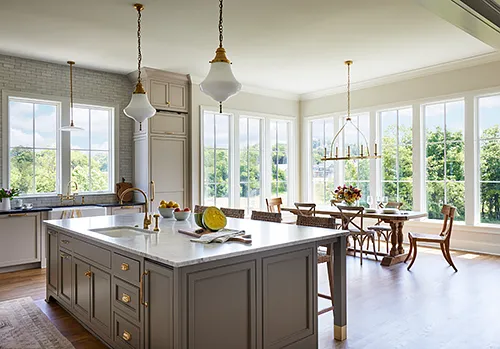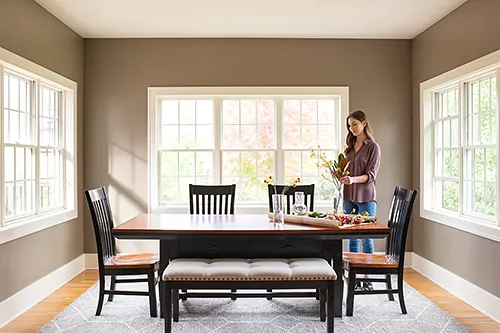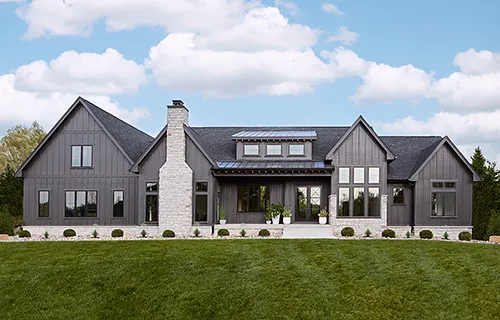
.png)
Search By Square Foot
• Up to 1000 Sq Ft
• 1001 - 1500 Sq Ft
• 1501 - 2000 Sq Ft
• 2001 - 2500 Sq Ft
• 2501 - 3000 Sq Ft
• 3001 - 3500 Sq Ft
• 3501 - 4000 Sq Ft
• 4001 - 4500 Sq Ft
• 4501 - 5000 Sq Ft
• 5001 Sq Ft And Up
Search By Square Foot
• Up to 1000 Sq Ft
• 1001 - 1500 Sq Ft
• 1501 - 2000 Sq Ft
• 2001 - 2500 Sq Ft
• 2501 - 3000 Sq Ft
• 3001 - 3500 Sq Ft
• 3501 - 4000 Sq Ft
• 4001 - 4500 Sq Ft
• 4501 - 5000 Sq Ft
• 5001 Sq Ft And Up
by Rachel Lyon, Editorial Director for The House Designers®
The humble farmhouse has a special place in the hearts of many. Perhaps a great eat-in kitchen and amazing covered porch first come to mind when you picture the quintessential farmhouse, but have you stopped to consider just how much windows define your home? The base of your window design is drawn into blueprints, but there is plenty you can do from there to craft the best final look. Here are the aspects of farmhouse windows to keep in mind to give your home that old-fashioned or updated charm you’re after!

A History of Divided Lites
There’s a reason that older houses and the architectural styles founded on them have divided lite, or multi-paned, windows. In the past, making glass was an arduous process and large, clear pieces were especially difficult to produce and very expensive as a result. Piecing several smaller panes together with wooden muntins created windows of the desired size, so divided lites were the norm for houses up until the 19th century. Advances in manufacturing then introduced machine-drawn glass, which improved the quality and the size of the panes that could be produced. Modern architecture was designed to take full advantage of these bigger and better windows, and while we incorporate higher quality glass into older house designs now, the framework it fits into hasn’t changed.
You can find examples of farmhouse architecture paired with modern window designs, though. Even if you can’t immediately identify the two juxtaposed elements for what they are, you’ll recognize the style they produce together as eclectic. These contemporary or modern farmhouses definitely have their own charm, but it is vastly different from that of a traditional farmhouse. Consider how you want the final picture to look; do you prefer the quaint appeal of lites, or do large solid panes provide the brighter, clearer, more transitional image you had in mind? While most homeowners in the past chose historically accurate designs, modern farmhouses are exceptionally popular these days. Be prepared to balance your exterior design, whichever style you prefer.

Operation Options
Windows open in a number of ways—they can slide up or down or side to side, wing out from any edge with hinges, or even swing and tilt from different sides—and of course there’s history there, too! Double-hung windows are widely favored for farmhouses because window sashes that could be pushed up or down in their frame were practical and simple enough for technology of the time. They also have an advantage over single-hung windows, which have a fixed sash on top while the bottom portion can be pushed up. The double-hung configuration lets you let in fresh air from the top and/or bottom, and that’s perfect for creating different kinds of airflow. You can simply enjoy a breeze when you sit by the window and even let rising smoke from a cooking mishap escape. Move both sashes to the middle and you can help hot air move out and cool air move in more effectively—taking advantage of the stack effect to provide natural climate control!
People have their own window preferences, though, and that means side-to-side glider and hinged casement windows have also found their ways into farmhouses. From a stylistic point of view, divided lites have a greater effect on the overall image of a home than the structure that determines how its windows open. If you want total architectural accuracy, hung windows are the way to go, but just about any mode of operation can provide a traditional look if it has lites. You know homesteaders didn’t splurge on glass doors, but with today’s focus on natural lighting and outdoor living, patio doors with divided lites deliver the right style to complete farmhouses to our modern standards.

Balancing a Farmhouse Façade
The farmhouse category is more diverse than you might think. We talk about them like everybody building in a rural location in the 1800’s followed the same plans, but a home built in a New England orchard won’t look like one built in Appalachia or on the plains of the Midwest. Building to adapt to the environment as well as the availability of glass in the area produced a variety of looks, and you can draw from correlations of the past to create the best design for your home.
For instance, choose to have multiple smaller lites if you want your farmhouse to seem more traditional, established, and rustic. Opt for fewer bigger lites or even none at all for an updated look. Explore the options and you’ll find plenty of divided lite patterns out there; whether you want all lites to be the same size, to have a different pattern between the top and bottom sash, want to infuse Craftsman character with prairie grilles, or are going for an eclectic look with something different for your windows, there are plenty of options! And stop to consider the view from the inside as well as from the curb—perhaps you’ll want to meet design and practical beauty halfway with a nine-over-one pattern that provides plenty of lites but also a larger pane to give you clear views of your property.
If you’re preparing to build a farmhouse plan or just looking to give your home a fitting remodel, the experts at Pella® have a huge range of windows to help you create just the ambiance you want. You’ll find plenty of divided lite patterns no matter how you want your windows to open, and with vinyl, fiberglass, and wood product lines, you can invest in the material of your choice. Schedule a free professional consultation for an expert recommendation today!